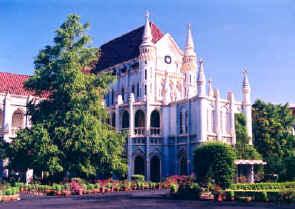The Madhya Pradesh High Court had issued contempt notices to advocates who had abstained from work on 27th April 2015 in pursuance of a strike by the lawyers of the High Court against the decision of Chief Justice A.M. Khanwilkar of constituting a committee to examine representations for creation of a circuit bench of the High Court in Bhopal.
 Such notices were issued while hearing a petition against the above strike and the court held that the above strike by the advocates was in violation of the mandate laid down by a 5-Judge Constitution Bench of the Supreme Court in the case of Harish Uppal (Ex-Capt.) v. Union of India, (2003) 2 SCC 45, wherein it was held as follows:
Such notices were issued while hearing a petition against the above strike and the court held that the above strike by the advocates was in violation of the mandate laid down by a 5-Judge Constitution Bench of the Supreme Court in the case of Harish Uppal (Ex-Capt.) v. Union of India, (2003) 2 SCC 45, wherein it was held as follows:
“35. In conclusion, it is held that lawyers have no right to go on strike or give a call for boycott, not even on a token strike. The protest, if any is required, can only be by giving press statements, TV interviews, carrying out of court premises banners and/or placards, wearing black or white or any colour armbands, peaceful protest marches outside and away from court premises, going on dharnas or relay fasts etc. It is held that lawyers holding vakalats on behalf of their clients cannot refuse to attend courts in pursuance of a call for strike or boycott. All lawyers must boldly refuse to abide by any call for strike or boycott. No lawyer can be visited with any adverse consequences by the Association or the Council and no threat or coercion of any nature including that of expulsion can be held out. It is held that no Bar Council or Bar Association can permit calling of a meeting for purposes of considering a call for strike or boycott and requisition, if any, for such meeting must be ignored. It is held that only in the rarest of rare cases where the dignity, integrity and independence of the Bar and/or the Bench are at stake, courts may ignore (turn a blind eye) to a protest abstention from work for not more than one day. It is being clarified that it will be for the court to decide whether or not the issue involves dignity or integrity or independence of the Bar and/or the Bench. Therefore in such cases the President of the Bar must first consult the Chief Justice or the District Judge before advocates decide to absent themselves from court. The decision of the Chief Justice or the District Judge would be final and have to be abided by the Bar. It is held that courts are under no obligation to adjourn matters because lawyers are on strike. On the contrary, it is the duty of all courts to go on with matters on their boards even in the absence of lawyers. In other words, courts must not be privy to strikes or calls for boycotts. It is held that if a lawyer, holding a vakalat of a client, abstains from attending court due to a strike call, he shall be personally liable to pay costs which shall be in addition to damages which he might have to pay his client for loss suffered by him.
36. It is now hoped that with the above clarifications, there will be no strikes and/or calls for boycott. It is hoped that better sense will prevail and self-restraint will be exercised. The petitions stand disposed of accordingly.”
(emphasis supplied)
The M.P. High Court therefore issued notices to advocates who abstained from work, giving them an opportunity to show cause as to why action should not be taken against them. The Court observed as follows:
“Not only they are rendered themselves liable to be proceeded against for contempt but also to pay the cost and damages to the litigants, who have suffered because of non hearing of their cases today.”
In pursuance of this order, notices have been issued to innumerable advocates, some of whom are now designated as senior advocates. In fact, even a sitting judge of the High Court was a victim of such issuance of notices. The reason behind such an unusual situation is that names of advocates appearing in old vakalatnamas were taken from the case files of all the cases that were on the causelist of the court on the day the strike was carried out.
A recipient of one such notice has been Senior Advocate Mr. Vivek Tankha, former Additional Solicitor General of India, who was served such notice in relation to a case taken up by him and vakalatnama signed about 20 years back. As reported by Times of India, Mr. Tankha has written a letter to the Chief Justice of India H.L. Dattu, explaining how the notices issued on such a large scale are wrong without proper care and that such judicial orders have been passed in a ‘casual and mechanical fashion’.
The link to MP HC Cause list link for hearing of show cause matters with reference to non-appearance of advocates due to boycott call given by Bar Associations is here.
Order of Jabalpur bench of MP High Court, dated 27th April 2015, can be seen here.
Supreme Court judgment in the above Harish Uppal case can be seen here.

